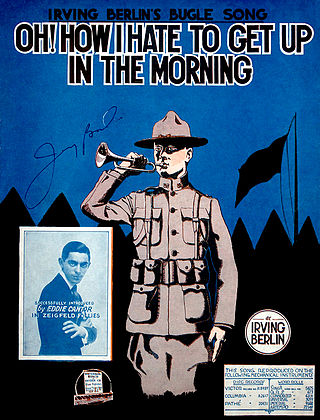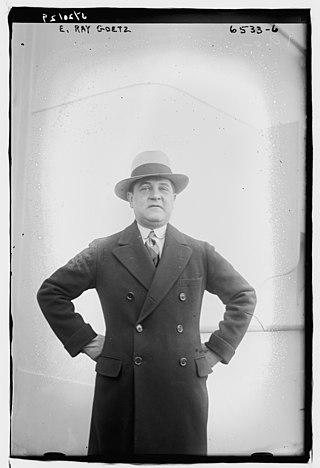Related Research Articles

Irving Berlin was an American composer and lyricist. His music forms a large part of the Great American Songbook.
This is a list of notable events in music that took place in the year 1913.
This is a list of notable events in music that took place in the year 1911.

Dorothy Fields was an American librettist and lyricist. She wrote over 400 songs for Broadway musicals and films. Her best-known pieces include "The Way You Look Tonight" (1936), "A Fine Romance" (1936), "On the Sunny Side of the Street" (1930), "Don't Blame Me" (1948), "Pick Yourself Up" (1936), "I'm in the Mood for Love" (1935), "You Couldn't Be Cuter" (1938) and "Big Spender" (1966). Throughout her career, she collaborated with various influential figures in the American musical theater, including Jerome Kern, Cy Coleman, Irving Berlin, and Jimmy McHugh. Along with Ann Ronell, Dana Suesse, Bernice Petkere, and Kay Swift, she was one of the first successful Tin Pan Alley and Hollywood female songwriters.

John Francis Burke was an American lyricist, successful and prolific between the 1920s and 1950s. His work is considered part of the Great American Songbook.
Robert Lissauer was an American composer, author, and musicologist.
Al Stillman(néAlbert Irving Silverman; 26 June 1901 Manhattan, New York – 17 February 1979 Manhattan, New York) was an American lyricist.
Harry Akst was an American songwriter, who started out his career as a pianist in vaudeville accompanying singers such as Nora Bayes, Frank Fay and Al Jolson.
Frederick Emil Ahlert was an American composer and songwriter.

Miss Liberty is a 1949 Broadway musical with a book by Robert E. Sherwood and music and lyrics by Irving Berlin. It is based on the sculpting of the Statue of Liberty in 1886. The score includes the song "Give Me Your Tired, Your Poor", a musical setting of Emma Lazarus's sonnet "The New Colossus" (1883), which was placed at the base of the monument in 1903.
Arthur James Johnston was an American composer, conductor, pianist and arranger.
"D'ye ken John Peel?" – which translates to "Do you know John Peel?" – is a famous Cumberland hunting song written around 1824 by John Woodcock Graves (1795–1886) in celebration of his friend John Peel (1776–1854), an English fox hunter from the Lake District. The melody is said to be a contrafactum of a popular border rant, "Bonnie Annie." A different version, the one that endures today, was musically adapted in 1869 by William Metcalfe (1829–1909), the organist and choirmaster of Carlisle Cathedral. The tune etymology has a long history that has been traced back to 1695 and attributed to adaptations – one in particular, from the 20th century, the 1939 jingle, "Pepsi-Cola Hits the Spot."
Irving Louis Burgie, sometimes known professionally as Lord Burgess, was an American musician and songwriter, regarded as one of the greatest composers of Caribbean music. He composed 34 songs for Harry Belafonte, including eight of the 11 songs on the Belafonte album Calypso (1956), the first album of any kind to sell one million copies. Burgie also wrote the lyrics of the National Anthem of Barbados. To date, songs penned by Irving Burgie have sold more than 100 million copies worldwide.

"Oh! How I Hate to Get Up in the Morning" is a song written by Irving Berlin in 1918 that gives a comic perspective on military life. Berlin composed the song as an expression of protest against the indignities of Army routine shortly after being drafted into the United States Army in 1918. The song soon made the rounds of camp and became popular with other soldiers, partly because hatred of reveille was universal.
Helmy may refer to:

Edward Ray Goetz was an American composer, lyricist, playwright, theatre director, and theatrical producer. A Tin Pan Alley songwriter, he published more than 500 songs during his career; many of them originally written for the New York stage. His songs were recorded by several artists, including Judy Garland, Al Jolson, and Blossom Seeley. He was active as both a lyricist and composer for Broadway musicals from 1906 through 1930; collaborating with artists like George Gershwin, Cole Porter, Sigmund Romberg, and A. Baldwin Sloane to create material for the theatre. Beginning with the musical Hitchy-Koo of 1917, he also produced several of the musicals and plays he was creatively involved in up until the 1930-1931 Broadway season when he produced his final stage work, Porter's The New Yorkers, for which he also created the story and served as director. He authored the play The Lady of the Orchids which he produced on Broadway in 1928. He also produced and served as production supervisor of Herbert Fields and Porter's 1929 musical Fifty Million Frenchmen which was adapted by Warner Brothers into a 1930 film of the same name. His work as a songwriter was featured in the films For Me and My Gal (1942), Somebody Loves Me (1952), and The Greatest Show On Earth (1952); the latter of which resulted from his work as the lyricist for the Ringling Bros. and Barnum & Bailey Circus during the final three years of his life. Having never stopped working, he died in 1954.
William James Baskette was an American pianist and composer who wrote popular songs of the Tin Pan Alley era. He also wrote one of the most successful World War I war songs, "Good Bye Broadway, Hello France".
Kresa is a surname. Notable people with the surname include:

This Is The Army is an American musical revue in two acts, designed to boost morale in the U.S. during World War II, with a book by James McColl and music and lyrics by Irving Berlin. It was produced by the U.S. Army on Broadway in 1942, with a cast of U.S. soldiers, for the benefit of the Army Emergency Relief Fund.
References
- ↑ ASCAP Biographical Dictionary (1948)
- ↑ "Helmy Kresa, Songwriter, 86". 23 August 1991 – via NYTimes.com.
- ↑ "White Christmas".